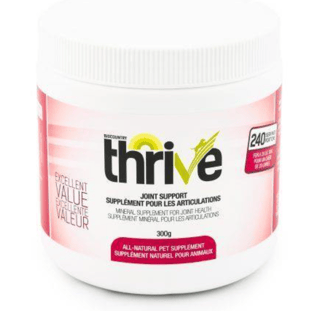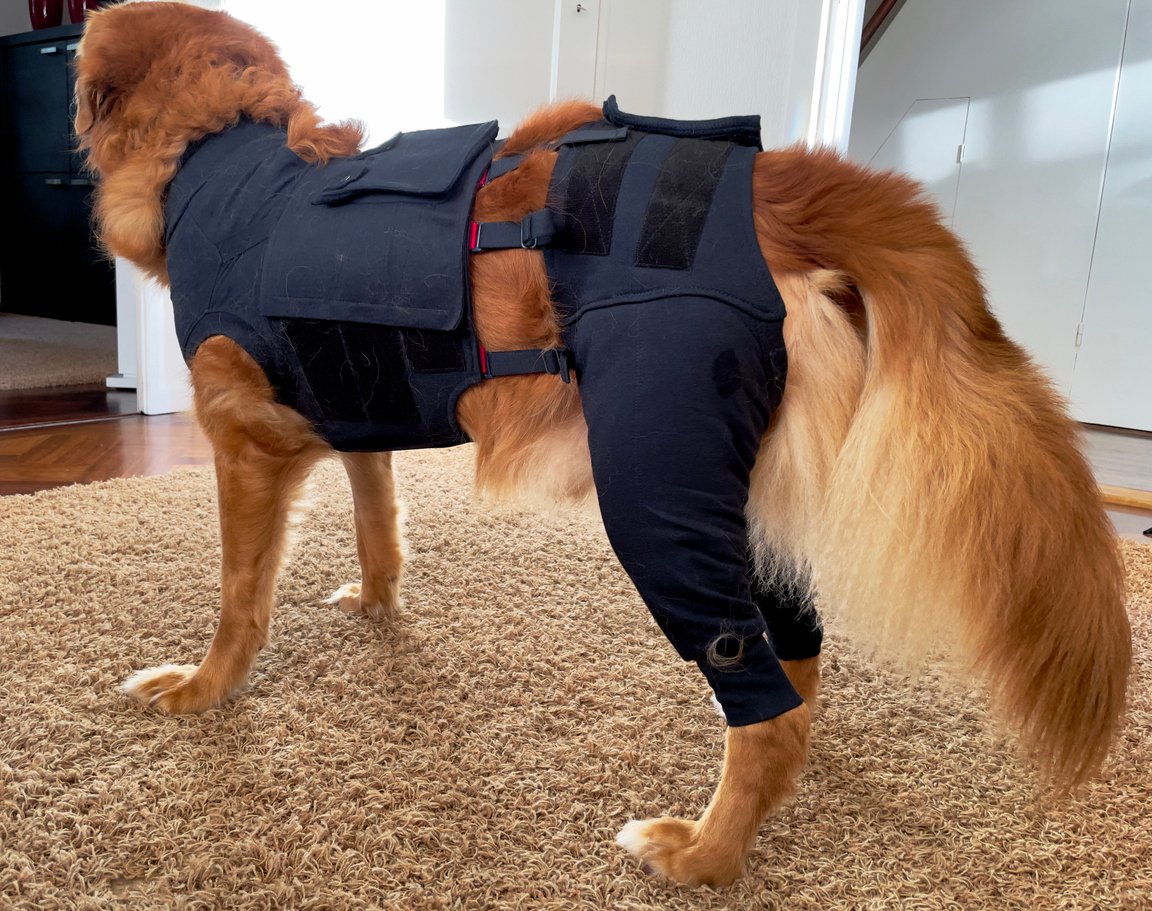Table of Contents
Big or small, there’s no doubt that we love our pups. In fact, over half (66%) of American households own a pet, with dogs being the most popular companion (65.1 million U.S. households own a dog) followed closely by cats (46.5 million households) and fish (11.1 million households). This doesn’t change much when you look at the Great White North. 60% of Canadian households own at least one dog or cat. That’s a lot of fluffy friends!
Dogs provide us with unconditional love and companionship, and in return, we do our best to take care of them in the best way possible. Unfortunately, due to breeding and as a result genetics, many dogs experience joint degradation and disease, with common ailments including hip dysplasia, dog arthritis, and general joint aches and pains.
Because of the prevalence of joint issues in dogs (osteoarthritis in dogs is estimated to affect more than 20% of dogs over one year of age), it’s essential that joint support for dogs is provided to help prevent or treat joint issues as your pup ages.
In this article, we discuss when you need to consider joint health supplements for dogs, the importance of providing your dog with joint support as they age, and product recommendations for dog joint support supplements.
When to Consider Joint Support for Dogs
There are a number of considerations to take into account when deciding the best time to incorporate joint health supplements for dogs into your pup’s diet. These considerations surround your dog’s age, breed, genetics, and whether they’re currently experiencing a joint injury or are prone to joint injuries.
Age
A common question that dog owners ask is “When can I start giving my dog joint support supplements?” The answer depends on your dog’s breed, the type of joint supplement you’d like to give your pup, and the recommendation of your veterinarian.
The general consensus is that you should wait until your pup reaches one year old before you start providing joint support for dogs. However, some sources suggest that if you have a dog that’s considered an at-risk breed for joint issues, you can start giving your dog a joint supplement as early as eight weeks.
If you and your veterinarian do decide that the best option is to provide joint support for your dog as early as possible (after they are eating solid food on a regular basis), it’s doubly important that you consider the ingredients of your chosen supplement.
Supplements with fillers and additives can be hard on a puppy’s stomach, so it’s important to choose a supplement with natural ingredients and little to no fillers and additives. TRI-ACTA is a great choice as it contains therapeutic amounts of 100% natural ingredients that naturally occur in your dog’s body, including glucosamine for dogs (HCl and Sulfate–both have unique benefits for your pup) methylsulfonylmethane (MSM, a natural anti-inflammatory) and chondroitin sulfate. These ingredients provide optimal joint support for dogs as they age.
TRI-ACTA for Pets
A proactive approach for developing and younger adult pets to maintain optimal joint health mobility, minimize inflammation and fend off age-related ailments.
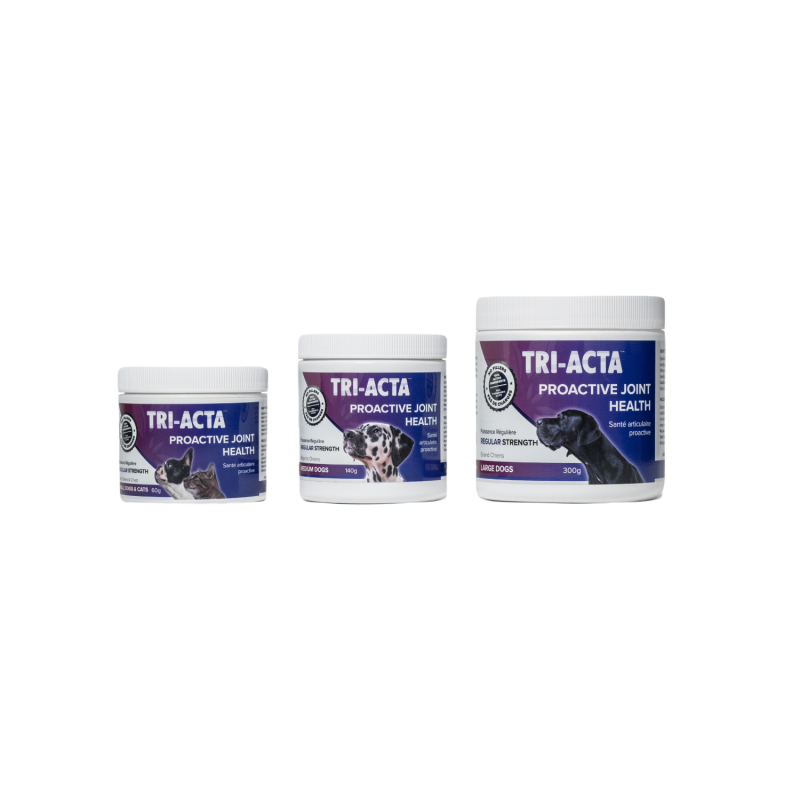
Breed
While all dogs are susceptible to joint degradation and disease, there are certain breeds that have a higher risk of developing joint issues. Breeds that are at a higher risk for serious joint issues are outlined in the table below:
|
Dog Breed |
Type of Joint Issue They are Susceptible to |
|
Rottweiler |
|
|
Golden Retriever |
|
|
Labrador Retriever |
|
|
Mastiff |
|
|
Boxer |
|
|
Italian Corso |
|
|
German Shepherd |
|
|
Bernese Mountain Dog |
|
|
Pomeranians |
|
|
Chihuahua |
|
|
Yorkshire Terrier |
|
|
French Bulldog |
|
|
All dog breeds |
|
In general, larger dog breeds tend to suffer more with conditions such as hip dysplasia and dog elbow dysplasia, while torn cruciate ligament dog seems to occur more frequently in Rottweilers, Golden Retrievers, and Labrador Retrievers. Small breeds like Pomeranians, Chihuahuas, and Yorkshire terriers have higher odds of developing patellar luxation, which is when the knee cap moves outside of the femoral groove (the part that holds the knee cap in place) when your pup flexes its knee.
Genetics
Many dogs experience joint conditions, and the general belief is that these conditions are more prevalent in pure-bred dogs. This is because many joint issues are inherited health conditions. Responsible breeding practices can help reduce the likelihood of your pup inheriting a serious joint condition, but it’s also important to remember that some dog breeds are susceptible to joint issues simply because of their body structure (Bulldogs, Labradors, and Border Collies are a few examples).
For example, Greyhound polyarthritis is a joint disease that, you guessed it, specifically affects greyhounds. The disease is characterized by thin and turbid (cloudy or murky with suspended matter) synovial fluid that clots upon contact with air, whereas normal synovial fluid is relatively clear and viscous and does not clot when exposed to air. Treatment for this condition involves doing all that you can to reduce inflammation and pain in your Greyhound’s joints, which can be achieved by giving them a joint supplement like TRI-ACTA H.A. The “H.A.” stands for hyaluronic acid, which is an essential ingredient for increasing the viscosity of the synovial fluid in your dog’s joints.
Joint Injury
If your pup has suffered a joint injury in the past or is a breed that is susceptible to joint injuries, it’s a good idea to get them started on dog joint support supplements as soon as possible. Some joint injuries are more likely to recur, especially ones caused either wholly or in part by joint degradation. This is because the joint structures are weakened, and even if they heal, the joint still isn’t the same as it was before.
To help your dog heal faster and more effectively from joint injuries, it’s important to provide them with joint support for dogs. TRI-ACTA H.A. is an effective extra-strength supplement, as aside from containing glucosamine HCl and sulfate like our regular TRI-ACTA (HCI is great for bioavailability and delivering more glucosamine to your dog’s body, while sulfate is an essential building block of your pup’s joints) as well as MSM, it also contains hyaluronic acid. This last ingredient increases the viscosity of the synovial fluid in your pup’s joints, allowing easier movement.
TRI-ACTA H.A. for Pets
Our maximum strength formula is optimally designed to accelerate the formation of cartilage, minimize inflammation, expedite the healing process, and improve joint conditions.
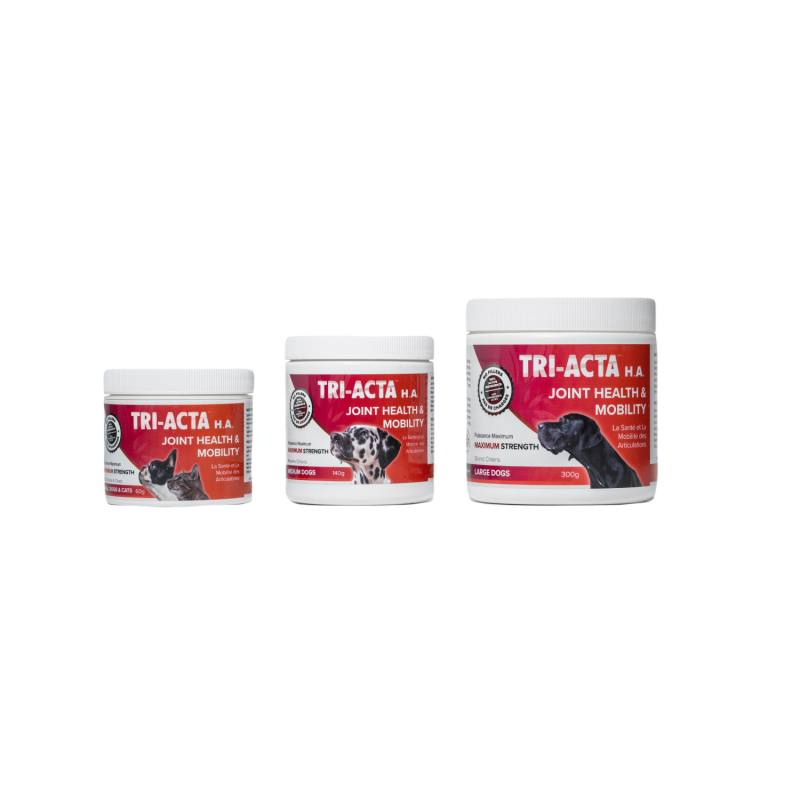
Types of Joint Support for Dogs

There are a wide variety of different ways that you can provide joint support for dogs. It’s not just about doing one thing like giving your pup supplements, you should also ensure that they get a high-quality, balanced diet, and plenty of exercise.
1. Joint Supplements
One of the easiest and most effective ways to give joint support for dogs is to incorporate joint supplements into their diet. Joint tablets for dogs and chewable joint supplements for dogs are two possible varieties, but tablets can be difficult to administer and chewables often contain fillers and additives. Powdered dog joint supplements, on the other hand, are typically very easy to administer because they can be simply sprinkled onto your dog’s food, and if you go for a supplement like TRI-ACTA that contains no fillers or additives, then you’re ensuring your dog gets the benefit of the supplement without all that other stuff that may cause stomach upset or aggravate allergies.
When choosing a joint health supplement for dogs, it’s important you look for options that contain therapeutic amounts of glucosamine, chondroitin, and MSM. If you have an older dog or a dog that’s experienced a joint injury, look for a supplement that includes hyaluronic acid as well.
The table below outlines what these different ingredients do:
|
Ingredient |
Benefit |
|
Glucosamine HCl and Sulfate |
|
|
Chondroitin |
|
|
MSM |
|
|
Hyaluronic Acid |
|
2. Appropriate Exercise and Physical Activity
Dogs need exercise and playtime to keep them physically fit and healthy. But while it might be tempting to play frisbee with your Mastiff, it’s important to recognize that different types of dogs need different types of exercise.
Large or giant breed dogs are susceptible to joint injuries if they twist or turn in awkward ways due to their body conformation. This means that playing frisbee, ball, or other games where your dog needs to jump and move their body at weird angles to catch the prize are not the best options, as it could result in a trip to the vet. Instead, consider swimming, tug-o-war, and taking your dog on a run in the dog park.
Conversely, smaller dogs like Yorkshire terriers and Chihuahuas can move easier (although the average frisbee would likely bowl them over!) so games of fetch with appropriately-sized balls and toys are encouraged.
3. High-Quality Diet
We all love the occasional fast food burger as a treat, but it’s not the healthiest option for your daily diet. The same goes for your pup: cheap food with lots of fillers and preservatives will keep them fed, but it’s not the best for their overall health.
To choose high-quality dog food, you should look at more than just the price. Various organizations around the world, including the Association of American Feed Control Officials (AAFCO), The Pet Food Association of Canada, and FEDIAF in Europe recommend the following when it comes to choosing the right food for your pet:
- Nutritional adequacy: Choose the right dog food for your dog’s specific life stage. If they are a puppy, choose a dog food that clearly indicates it’s for puppies (puppies need more calories than adult dogs). Also, look for a statement on nutritional completeness or adequacy, as this will tell you if the food is meant for regular daily consumption or just as an occasional treat.
- Ingredients: Pet food ingredients are generally listed from most to least. What you should be looking for in your dog’s food ingredients is meat or poultry protein, which will be listed as meat (flesh and fat), meat byproducts (organs, fatty tissue, and bones), or meal (can be a variety of ingredients like stomach contents, feathers, and more). Basically, the quality of ingredients when it comes to meat goes like this: meat, meat byproducts, and meal. Ideally, you want to choose a dog food that contains as much meat as possible.
- Nutrient density: Dogs need more than just meat. They also need calcium, phosphorus, and vitamin D to keep their teeth and bones strong. Be sure that the dog food that you’re choosing is nutritionally balanced.
Importance of Joint Health Supplements for Dogs
Providing your pup with joint support is essential, given the prevalence of joint conditions in dogs of all breeds and ages. Most joint supplements are easy to administer, and there are options available, like TRI-ACTA, that have no fillers or additives that may cause issues for your pup. Combined with a high-quality diet and appropriate exercise, you’re giving your pup the best chance of preventing joint issues or living as comfortably as possible with them should they experience joint problems later in life.
Proactive Joint Support for Dogs
One of the most important ways that you can provide effective joint support for dogs is by being proactive. Even if your dog isn’t currently limping around the house or showing signs of joint pain, it’s still a good idea to give them joint supplements now rather than wait until they start showing symptoms.
Like humans, as dogs age, their body doesn’t produce as many of the essential ingredients needed to maintain optimal joint health. If you’re over 30 and you’ve tried to get up from a chair or the couch recently, you probably understand what it’s like to suddenly realize that your joints just aren’t what they used to be!
Your pup is the same way. But if you’re proactive and give them dog joint support supplements, then you’re giving your dog’s body what it needs to keep their joints at optimal health, even as they grow older.
TRI-ACTA for Pets
A proactive approach for developing and younger adult pets to maintain optimal joint health mobility, minimize inflammation and fend off age-related ailments.

Your Dog’s Painful Joints May Not Be Obvious
Dogs, like most animals, have evolved to hide their pain. This is because of their pack mentality, where sick and weak dogs become a liability for the rest of the pack. Predators will target animals that appear to be slow, weak, or sick because they are easier to catch compared to healthy individuals.
If a dog’s pack realizes that a dog is slowing them down or increasing their risk of being attacked by predators, they will shun that dog and exclude them from the group. Because your dog recognizes you as part of their pack, they will try their best to mask their pain in front of you to avoid being abandoned.
Because of your dog’s natural instinct to hide their ailment, it’s important to remember specific signs that your dog might be in pain. Some of these can apply to all types of pain that your dog might be experiencing, while others are more specific to joint pain:
- Reluctance to climb stairs, on the couch, or jump into the car when they would do these things before without issue
- Lethargy or overall decreased interest in activities, including walks and playtime
- Stiffness when rising from laying down or a sitting position
- Decreased appetite
- Pacing and inability to settle
- Frequent shifting of body weight when laying down to constant pressure on a certain area
- General irritability
- Excessive licking or biting of a particular area, such as a joint
Best Dog Joint Support Supplements and Vitamins on the Market
With so many dog joint supplements available online and in pet stores, it can be difficult to choose one that will work for your dog. One of the most important first steps that you can take is learning how to read a supplement label.
Different supplements will have different formatting and language, but there are some specific things you can look for:
- Active versus inactive ingredients. Active ingredients include glucosamine, chondroitin, and MSM, while inactive ingredients include flavours, colours, and additives like gums. Check to see how many active ingredients are in each serving. Most supplements will list this on the packaging or on their website. If the serving size exceeds the number of active ingredients, then you know the number of fillers. For example, if the serving size is 1g (1000mg) and the product indicates that each serving contains 500mg of glucosamine and 250mg of chondroitin, you know 250mg is dedicated to other ingredients.
- Designations. If the supplement has a designation by a regulatory body, it will usually appear just above the barcode on the label and is an indication that the supplement has good quality control, regularly tests its ingredients, and much more. The Veterinary Health Product designation is what you should look for when choosing Canadian products, while the NASC quality seal is for products made in the USA.
With those points in mind, let’s get into some recommendations for dog joint support supplements:
1. TRI-ACTA and TRI-ACTA H.A.
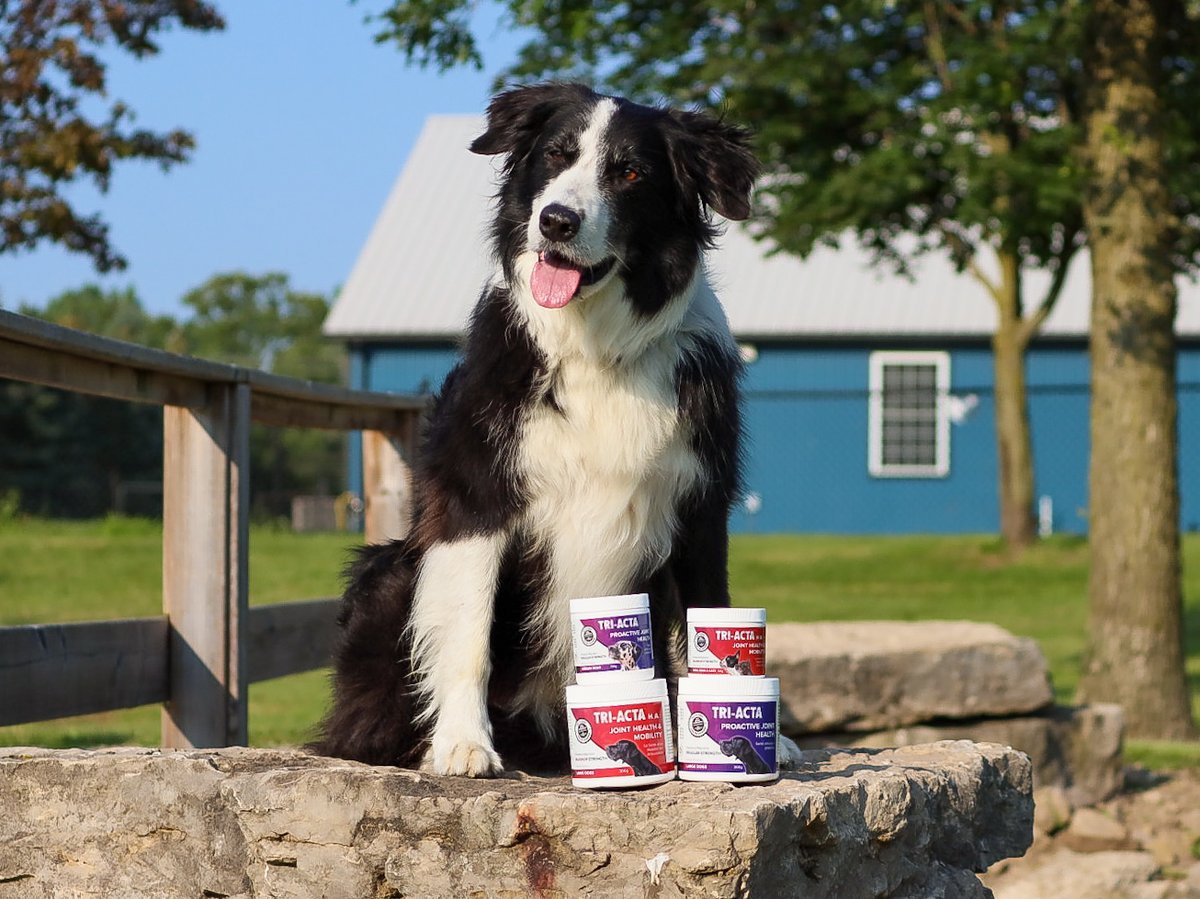
TRI-ACTA products are great choices for joint support for dogs. This powdered joint supplement has 100% active ingredients, meaning no fillers, additives, or preservatives. It also means that each dose contains the maximum amount of therapeutic joint support you can give your dog.
One of the standout features of TRI-ACTA products is that they contain two types of glucosamine—HCl and sulfate. These different glucosamines each provide unique benefits for your dog. Glucosamine HCl is more bioavailable, which means your dog’s body will absorb it faster. Glucosamine sulfate contains sulfur, an essential building block for your dog’s joint structures, assisting with repair and preventing degradation. The combination of both types of glucosamine ensures your dog gets the maximum benefit from the supplement.
- TRI-ACTA is an excellent choice for preventative joint support for dogs that don’t currently have joint issues or only have minor joint problems.
- TRI-ACTA H.A. is our extra-strength joint supplement with hyaluronic acid, which assists in increasing the viscosity of the synovial fluid in your pup’s joints. More viscous synovial fluid results in more effortless movement and less joint friction.
TRI-ACTA H.A. for Pets
Our maximum strength formula is optimally designed to accelerate the formation of cartilage, minimize inflammation, expedite the healing process, and improve joint conditions.

Starts at $23.99 CAD for a 60g container of TRI-ACTA and $27.99 for TRI-ACTA H.A. Pricing as of August 2023.
2. Thrive Joint Support
Another powdered supplement for dogs is Thrive, which contains therapeutic amounts of glucosamine, chondroitin, and MSM in each serving with little filler and additives. However, this product only contains one form of glucosamine, so your dog may not get the maximum possible benefit from this supplement compared to other choices that contain glucosamine sulfate and HCl.
$27.00 for a 300g container. Pricing as of August 2023.
3. Spot Farms Chicken Jerky Hip & Joint
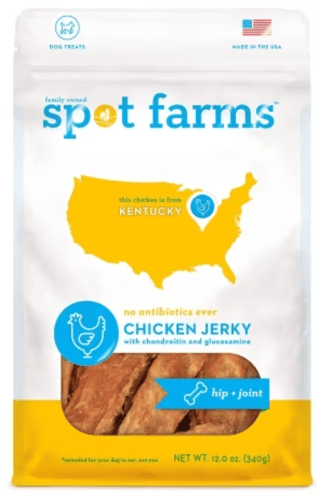
If you’d like to incorporate joint health into your pup’s treats, Spot Farms Chicken Jerky is a good choice. The first ingredient in the treat is chicken, and while it does have fillers and additives, all of them are pronounceable (vinegar, cane sugar). Each treat does not contain a therapeutic amount of glucosamine (500mg of glucosamine HCl per kg, and 300mg of chondroitin per kg, with one bag being only 340g), but it provides a nice supplemental treat for your pup.
$24.99 for a 340g bag. Pricing as of August 2023.
Summary
Providing joint support for dogs is essential, especially with the wide prevalence of joint disease and degradation issues that dogs of all sizes and breeds face.
The best dogs joint supplement that you can give your pup should ideally have 100% active ingredients. TRI-ACTA products only use active ingredients, making them a cost-effective and therapeutic choice for your dog’s joint health.
Purchase TRI-ACTA today, or learn where to buy in stores.
Newsletter Signup
Subscribe to our newsletter to receive the latest news and exclusive offers.
.jpg?height=2000&name=Cliick_Integricare-DISPLAY-REVISEDV2%20(1).jpg)
Proactive & Therapeutic Joint Supplements
When given daily, Integricare joint supplements recover bone and joint injuries faster and help prevent mobility injuries from happening in the first place.



